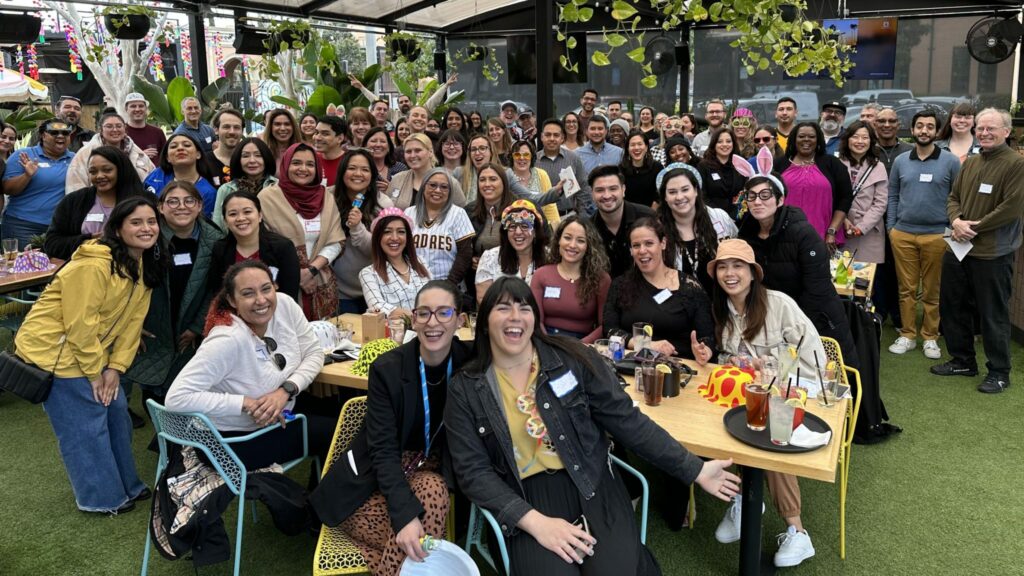Why Local Business Owners Need the San Diego Workforce Partnership

All of us need help in our careers at some point. That can be true whether we’re workers or business owners, regardless of how many years of experience we have in either role.
Workforce needs are continually evolving for employees and entrepreneurs alike. How can purposeful employers find the right talent with the right skills to do the impactful work they need, right now? And how can workers gain the skills and confidence to connect with employers that pay well, take care of their employees, and offer real opportunities to grow and advance?
Enter the San Diego Workforce Partnership. Learn how local business owners who care about doing business for good—in terms of both impact and longevity—can tap into the Workforce Partnership’s high-quality resources at absolutely no cost.
How the San Diego Workforce Partnership helps boost San Diego’s workforce
The San Diego Workforce Partnership, a local 501(c)(3) nonprofit, plays a critical role in advancing the workforce in San Diego.
The Workforce Partnership’s mission is to ensure that all job seekers have access to meaningful employment, and all businesses have access to a trained and skilled workforce.
“We play ‘matchmaker’ by delivering programs that connect the work people are passionate about doing with local businesses who need that talent,” said Angel Stancer, senior manager of business services at the Workforce Partnership and Business For Good Business Resources committee chair.
The greatest part is, the Workforce Partnership’s high-quality services are all completely free of charge to businesses and job seekers.
“Businesses are already paying for the Workforce Partnership’s services through their unemployment insurance (UI) tax,” Angel said. “The Workforce Partnership puts their tax dollars to work.”
The Workforce Partnership serves all job industries in San Diego. But their main focus is what they call priority sectors.
“Priority sectors are industries that have the right mix of advancement opportunities, livable wages, and yearly openings for middle-skilled jobs—careers that require technical education and training, but not a four-year college degree,” Angel said.
Priority sectors in San Diego include:
- Advanced Manufacturing
- Healthcare
- Energy, Construction, and Utilities (including many in-demand green jobs)
- Information and Communication Technologies (ICT)
- Life Sciences
- Public Administration
- Education
“We work hard to get the word out about our services by teaming up with our economic development partners throughout San Diego County,” said Claudia Huerta, vice president of business engagement and partnerships at the Workforce Partnership. “Our partners are cities, industry organizations, the SBA, regional and multicultural chambers of commerce, regional economic development partners, and our SBDC network.”
Giving job seekers the training and placement to have careers they love
The breadth of services and support the Workforce Partnership offers for job seekers in San Diego, at no cost, is truly mind blowing.
Here are just some of the ways the Workforce Partnership helps advance all workers in our region:
- Job Training and Placement: Programs include industry-specific training, apprenticeships, on-the-job training, and job placement services.
- Career Services: The Workforce Partnership has 7 Career Centers in San Diego that offer job search and career development resources to all San Diego County job seekers ages 16 and older, regardless of income or background—at no cost.
- Youth Programs: Support young adults in their transition from high school to the full-time workforce with summer employment opportunities, paid internships, career exploration programs, and mentorship programs that give young people the key skills and experience they need to kick-start bright careers.
- Career Services for Foster Youth Support: Including housing, counseling, education, and job-readiness training.
- Career Services for Justice-involved Young Adults: Employment and training for young adults who have been impacted by the justice system.
- Gateway to College and Career: Supports immigrants, refugees, and English language learners with self-sufficiency and empowerment.
- Ticket to Work and Self Sufficiency: Helping Social Security beneficiaries become financially independent.
- Helping Individuals Retain Employment (HIRE): Connects Black young adults with employment and education services.
- Behavioral Health Services Supported Employment: Increasing employment opportunities for individuals with mental illness.
Supporting local businesses at every stage of their lifecycle
Business owners know how much work it takes to keep a business afloat. Challenges are always present, but they change over time depending on the growth stage you’re in.
“The Workforce Partnership helps businesses at every stage of their lifecycle,” Angel said. “All our time and services are at no cost. For the actual programming—meaning, access to capital—we co-invest with businesses. The Workforce Partnership puts up some dollars, and we ask businesses to do the same. The Workforce Partnership usually offsets the business’s cost of hiring or training by about 50%. And since we both have skin in the game, it’s a win-win.”
Here’s how the Workforce Partnership helps businesses at three key points in their lifecycle:
- Starting up: When businesses are looking for their first or second hire, they often approach the Workforce Partnership. “They want to know what people are looking for in jobs and how they can be sure to tap into talent that will service their industry,” Angel said. “Sometimes they need help with an operations manual or employee handbook. We put them in touch with the right folks in our extensive network who can help.”
- Expanding/growing: Businesses in this stage often have recruitment pain points. “They’re posting jobs but not getting the right kind of candidate,” Angel said. “We talk to them about things like wage benchmarking and job quality indicators to help them understand if they’re offering the job aspects people are looking for.” Access to capital is another common need for businesses at this stage. They want to upskill their existing workforce and move people up the career ladder internally.
- Restructuring/downsizing: The Workforce Partnership can support businesses before, during, and after layoffs. They oftentimes can help with access to funding that may help defray costs that are causing layoffs or retain some workers by upskilling them. “We also support affected laid-off workers in many ways,” Angel said. “We help them access unemployment funds, transition to another job for rapid reemployment, and provide wraparound services like childcare, transportation, and other barriers to staying employed.”
- Free participation in the Workforce Partnership’s top-tier job fairs: “We’ve had a lot of interest around our county-wide job fairs,” Claudia said. “The Workforce Partnerhip’s job fairs are always highly attended, and both businesses and job seekers can participate at no cost. Most job fairs charge a fee for businesses to participate, which can be unaffordable for some small businesses, especially underrepresented ones.”
Creating real economic development in San Diego
Depending on who you ask, economic development has different meanings. To both the San Diego Workforce Partnership and Business For Good, it means one thing: equitable opportunity.
“When we talk about economic development, we mean inclusive upward mobility,” Claudia said.
Oftentimes, underrepresented groups aren’t even aware of the quality job training, placement, and career support services that the Workforce Partnership provides.
“We’re always thinking of ways to increase awareness of our services for underrepresented groups so they have real career pathways that pay enough to live in San Diego,” Claudia said. “But we also want to do the same for local small-to-medium businesses. If only big companies can take advantage of these services, that doesn’t help move the needle at all.”
Inclusive business growth also means that there are more diverse business owners who reflect the communities they’re rooted in: a shared goal of the Workforce Partnership and Business For Good.
“In San Diego, 66% of businesses have less than 10 employees,” Angel said. “We want to effect change with that population of leaders, making sure they stay relevant and competitive.”
As chair of the BFG Business Resource Committee, Angel launched the new Business For Good professional development series this year for that exact reason. Each comprehensive workshop gives local business owners straightforward education and resources to deal with the most common business issues and compliance challenges.
The Workforce Partnership’s ultimate goal is to continue to increase awareness of their organization and let more people know they exist, and can help.
“Our no-cost services are here, they’re high-quality, and they work,” Claudia said. “For our business clients, our job is to demystify the often daunting pathway to success for small-to-midsize, BIPOC, and minority-owned businesses across San Diego. Because that’s what it takes to create real economic development all around.”
